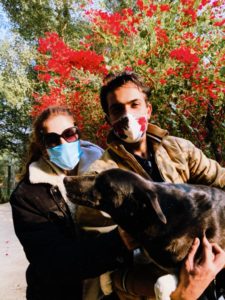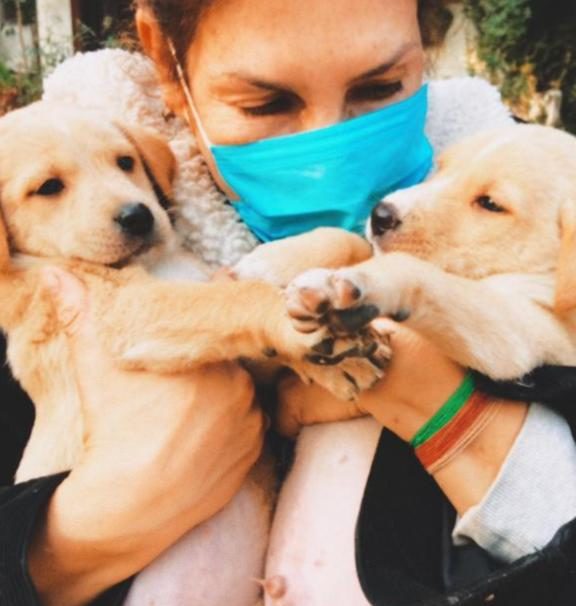Tina Antoniades with the support of locals took care of the dozens of dying stray dogs during the pandemic months, in the process, creating civic awareness. A model to replicate….
The pandemic was a crisis for all of us in some measure, in these trying times there were some who spent their time with compassion towards other denizens. Tina Antoniades with help of some friends directed her compassion towards the most vulnerable—the stray dogs in Sainik Farms—the locality she resides in.
A designer who grew up in London and spent a good part of her working life in the US, Tina is the creative director of Lulu & Sky—a premier fashion brand that operates as an e-commerce site featuring clothing and accessories for women. Despite her busy life, she would work hard to serve stray dogs and even galvanised the support of society to serve the animals.
These were the months of complete lockdown when the people were even scared of venturing out of the confines of their homes—pandemic was this unseen monster who could attack anyone, no one felt safe. And each of us—the humans—was a potential danger for the other.
Tina thought otherwise, when she’d venture out of the house she’d witness the sufferings of the street dogs who were in a deplorable condition and there was no one to take care of them. It was too much for Tina to bear, an animal lover who has some dozen dogs as pets.
She decided to act and not let stray dogs die a miserable death. “During the lockdown, thankfully, with many challenges and objections, we managed to get a curfew pass. It was important to keep the dogs fed and healthy as the streets were dead and it was scary moving out of the house. We couldn’t turn our backs on these kiddies we’ve been looking after for so long, especially in the adjoining city forest where the dogs definitely wouldn’t have survived.”

Tina was able to get the help of the forest officials who allowed “a couple of us to continue and they also provided a meal in the evenings and we provided one in the mornings as no one was coming, giving biscuits, food, water, etc.” Annalika, another local, was with Tina, all the way through the lockdown on this difficult journey in the city forest. She was a big influence. “We worked as a team and I wouldn’t have managed without her. Annalika was good at communicating with the forest officials,” Tina explains.
And few other people joined and they took turns for three months to medicate the dogs three times a day religiously. “Most of the dogs in the city forest have been sterilized that was taken upon myself and Annalika,” says Tina. A bunch of supporters from neighbouring Saket were very supportive, supplying medicines, contributed money and provided for any other needs on request.
Tina with a group of animal lovers initiated a mega rescue operation, which had to be carried out on a daily basis. Providing food was not sufficient in many cases, a designated place was needed to treat many of the sick dogs. “Thankfully, a group of us managed to get together and we built a makeshift dispensary to treat the dogs,” she recounts. A kind vet, Dr. Manu, chipped in and came to the rescue with sick and critical dogs, without his advice many would have died,” she explains.
Tina doesn’t like to talk about her personal life, lives with Ranjit Grewal who she prefers to call her “partner” rather than a “husband” happens to be a successful Indian entrepreneur.
Tina could muster the support of society and her operation widened. “We added more lanes in our protection drive and met some wonderful people on the way donating funds, rice, atta, etc.” Ranjit recollects they were days when they’d wake up very early in the morning to cook food for the dogs.
Tina realises that to feed dozens of dogs is only a transitory solution, the proliferating of their population in the locality also needs to be managed so that all of them can have a decent life. Tina also initiated a “sterilization programme with the help of a few residents and, in the process, have also managed to vaccinate many dogs.”
The process is still on. To be able to do that they have a cart that carries food and medicines. It’s run on the donations of the local residents. A vet visits on a weekly basis to take stock of the ailing dogs in the locality. Also with the support of the forest officials, Tina and her supporters have proactively earmarked spots as the dog feeding points plus water stations. The trash cans lying by the street or the littering of paths in the city forest doesn’t happen as a result. “Everyone can enjoy their walks and help keep the areas clean,” explains Tina.

Kindness attracts kindness. Tina is glad that she found many in her locality who are dog lovers. But they had their concerns and many of them were too scared to venture out of their house because of the Covid-19. There are very few like Tina who’d risk a pandemic to take care of the stray dogs. But they were helpful and gave “resources and supporting our venture,” she appreciates their contribution. WARWA—the local residents association is very supportive. One of them was a gentleman who is part of the wildlife fraternity, usually deals with snakes, deer, and wild animals, and is hands-on with dogs of Sainik Farms as well as some other residents.
This is a problem not confined to Sainik Farms but all over the NCR, even the country. A good reflection of society is the way in which animals are treated. India has tolerance but the care aspect seems to be missing. Tina doesn’t want to sit on judgement, “I really don’t know much about other colonies and how they treat the strays. (But) we have residents who send their cars immediately for the injured dogs, animals etc.,” she emphasizes. She narrates an incident when a cow gave birth to a calf outside her house. “Within 10 minutes a van and team arrived to deal with the situation,” she recounts.
As they say love, and also care, is a universal language. Also, taking care of the stray can help deal with larger civic issues. “Most importantly, with time it became a team effort and effectively controlled the growing population of stray dogs,” emphasizes Tina. Her model and initiative need to be replicated elsewhere in the city. Individual passion backed by social awareness and cooperation can do wonders even during the pandemic.





